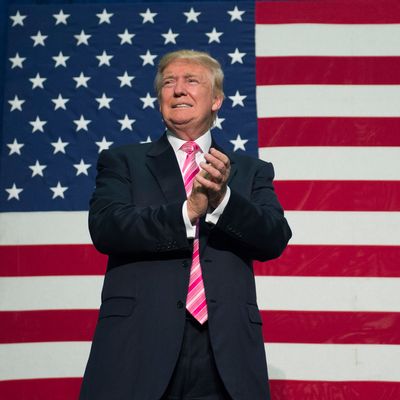
Two weeks ago, the New York Times reported that Donald Trump’s focus groups found voters frequently use two words to describe their candidate: “unqualified” and “racist.” This assessment, while encouragingly on-point, presents a serious obstacle to the Trump campaign. And so, it has set out to mitigate this liability with “a full-fledged strategy to court black and Latino voters,” reports the Washington Post.
The main difficulty Trump faces in dispelling the impression that he is a racist is that Trump is, in fact, a gigantic racist. His first appearance in the New York Times came in the context of his being caught refusing to rent apartments to African-Americans. A former Trump employee has detailed a series of private racist statements and acts — saying “laziness is a trait in blacks,” objecting to black people working for him in accounting, his staff shooing black people off the casino floor when he arrived. Trump has replied that the comments were “probably true,” but berated the person who made them as a “loser.” He has questioned the legitimacy of President Obama’s birth certificate, called him a “terrible student,” and implied he only made it into Harvard Law School due to affirmative action.
Trump’s gambit reportedly centers on Hillary Clinton’s support for the 1994 crime bill. That law, which was supported at the time by most African-Americans in Congress, was attacked by Republicans for spending too much money on crime-prevention programs rather than police and prisons. (Republicans made “midnight basketball,” an effective program for young African-American males in high-crime urban neighborhoods, the subject of special derision.) The crime bill, though, has since fallen out of favor, especially among liberals, who fault its punitive approach. Trump plans to exploit Clinton’s support for that bill, following “a private poll of black voters,” which finds “that their support [for Clinton] dips once they learn about her advocacy for the 1994 crime bill.”
Attacking Clinton for having supported punitive crime policies two decades ago is quite a turn for Trump, who is running on a platform of punitive crime policies right now. It was only last month when he made the entire theme of his acceptance speech at the Republican National Convention “law and order,” promising a brutal crackdown on crime, and lambasted Obama for encouraging black criminals by calling attention to police mistreatment of African-Americans. Trump also once spent his own money on a newspaper ad calling for five minority youths to be executed for a rape they turned out not to have committed. “What has happened to the respect for authority, the fear of retribution by the courts, society and the police for those who break the law, who wantonly trespass on the rights of others?,” he wrote, urging, in hysterical all-caps, “CIVIL LIBERTIES END WHEN AN ATTACK ON OUR SAFETY BEGINS!”
Trump has spent more than a year identifying himself as the candidate of white-backlash politics, using his appeal to the most racially resentful Republicans to win the nomination. And now he’s running to Clinton’s left on criminal justice! Trump adviser Roger Stone tells the Post, “an entire generation of young black men are incarcerated” because of the 1994 bill. So African-Americans should instead vote for the candidate who literally called for “retribution” and an end to civil liberties. Does Trump’s campaign really think anybody is going to believe this?






























